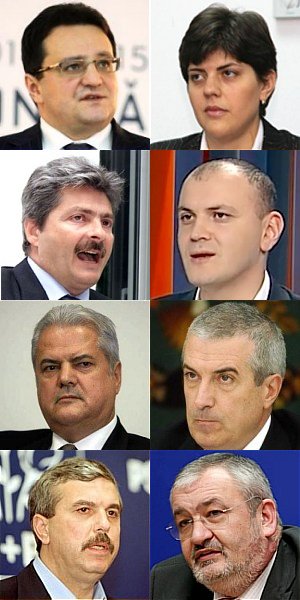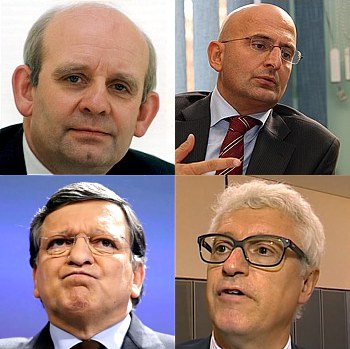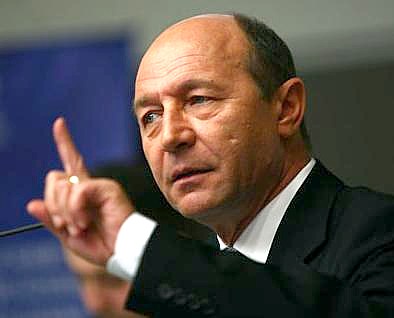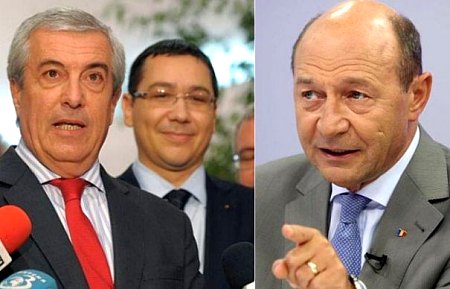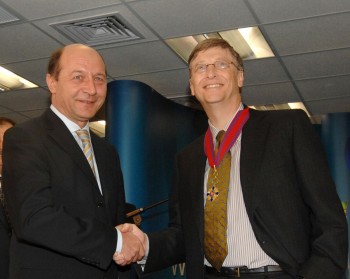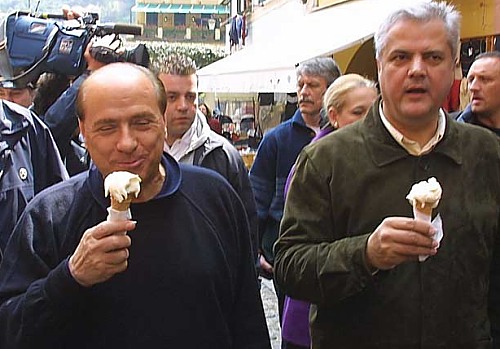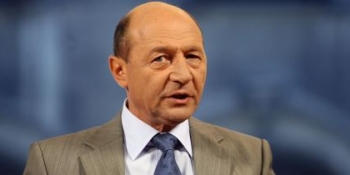
Telegramele Wikileaks 22
În martie 2005, Băsescu îi comunica însărcinatului cu afaceri al Ambasadei SUA la Bucureşti că, pentru securizarea frontierelor României, fusese încheiat un contract corupt cu EADS. Şi că, mai mult, contractul era aproape inutil, deşi costa 800 milioane USD. Ambasada notează, de altfel, că acestea erau şi suspiciunile americanilor (pasaj original: On a more positive note, a border surveillance contract issued without tender to EADs and worth about 800 million USD is also being closely scrutinized. President Basescu recently told the Charge that the contract was corrupt (as we suspected) and almost wholly redundant.)
DECL: 03/24/2015
TAGS: PGOV, PREL, KDEM, SOCI, ECON, PHUM, EINV, EFIN, RO, ETRO, biographic information, political assessment
SUBJECT: SCENESETTER FOR DEPUTY SECRETARY OF STATE ZOELLICK’S MARCH 30 VISIT TO BUCHAREST
REF: A. A) BUCHAREST 476 B. B) BUCHAREST 429
Classified By: CHARGE D’AFFAIRES THOMAS DELARE FOR REASONS 1.4 A, B ANDD
1. (C) Introduction and Summary: Embassy Bucharest warmly welcomes your March 30 visit as a tangible demonstration of the deepening U.S./Romanian partnership. Your visit will provide an opportunity to underscore the points raised during the successful March 8-10 visit by newly elected President Traian Basescu to Washington. During the first few months of their mandates, President Basescu and Prime Minister Calin Popescu Tariceanu pledged to vigorously battle corruption, supported implementation of free market economic reforms and promised to steer Romania to EU accession in 2007. We note, however, that the charismatic and staunchly pro-U.S. Basescu has more energetically asserted the primacy of the U.S.-Romanian strategic alliance than Tariceanu and FM Mihai Razvan Ungureanu, whose pro-American views are tempered by a generally Euro-centric philosophy. Nonetheless, both the PM and FM share Basescu’s view that Romania should remain a stalwart supporter in the GWOT and seek to deepen its integration into transatlantic values and institutions. Your visit will permit you to discuss Romanian progress on key issues raised during President Basescu’s visit earlier this month, including plans to lift Romania’s ban on international adoptions. End Introduction and Summary.
Romania’s “Orange Revolution”
––––––––––
2. (C) Basescu’s upset presidential victory against former Prime Minister Adrian Nastase on December 12 surprised even his closest political advisors and ushered in a new era of center-right government following four years of political dominance by the center-left Social Democratic Party (PSD), whose senior leaders were viewed by many Romanians as arrogant and corrupt. Upon the initial release of results on election night, youthful Basescu supporters clad in orange flooded the streets of central Bucharest in a scene reminiscent of events in neighboring Ukraine the week before.
In subsequent weeks, Basescu appointed center-right co-leader Calin Popescu-Tariceanu as prime minister, and rebuffed attempts by the PSD to maintain a hold on the government and parliament. Basescu and Tariceanu asserted that they were committed to leadership untainted by corruption or communist pasts.
3. (C) The new cabinet they formed is the youngest in Romania’s post-communist history, with an average age in the late 30′s, including FM Ungureanu, who was a Foreign Ministry State Secretary from 1998 to 2000. The cabinet also includes many members with solid experience in the private sector and NGO community. However, the new government is faced with a
significant minority opposition in parliament and, with such a new team, is still working to get its “sea legs” in handling tough domestic and international issues. We have seen occasional signs of tension between the robustly pro-American Basescu and the more Euro-centric Tariceanu (a francophone who made his fortune as owner of a Citroen distributorship) and Ungureanu in the first several months of the new government. On one occasion, for example, the FM publicly qualified the President’s endorsement of “preemptive” anti-terrorist actions by the GOR as “mere intellectual exercises.” A senior Basescu adviser recently lamented to Embassy that the PM’s office and key ministries appear (at least to the Presidency) as sometimes disorganized and lacking focus.
Seeking Strong Transatlantic Ties
–––––––––––
4. (C) During his presidential campaign, Basescu repeatedly made reference to what he called a “Bucharest-London-Washington” axis. He clearly intended to emphasize that his government would seek to strengthen Romania’s “strategic partnership” with the U.S. and Britain. We understand such assertions have raised eyebrows in Brussels, Paris, and Berlin. Nonetheless, Basescu has refused to back off his robustly pro-American stance. When pressed by the media as to what such a special relationship would entail, Basescu has pointed to the importance of a U.S. role in the Black Sea region and Romania’s solid commitment to the NATO alliance. Post has sensed a somewhat less enthusiastic response on this policy from PM Tariceanu and FM Ungureanu, who are keenly focused on securing Romania’s proposed 2007 EU accession.
5. (C) Nonetheless, the PM and FM share Basescu’s desire for a strong strategic relationship with the U.S., including enhanced cooperation in the Black Sea area. Since Basescu’s visit to Washington, senior MFA interlocutors have underscored to Charge and other Embassy officers the GOR view that the Black Sea region is central to Romania’s security, urging the USG to weigh in with other littoral states, especially Turkey, in support of Romania’s proposed establishment of a Romanian-Bulgarian-Turkish “Black Sea Task Force” linked to NATO structures. This proposal, however, exists only on paper and the GOR tells us that Turkey opposes it, preferring an expanded role for BLACKSEAFOR and Turkish-led Operation Harmony.
6. (C) Basescu and his team are clearly enthused about the “Orange Revolution” that swept into power in Ukraine and here and would like to use the momentum to help jar loose the long
frozen conflict between Moldova and Transnistria. With the strong support of FM Ungureanu and lower-level advisors in the MFA, Basescu has vocally advocated increasing Romania’s role in the settlement process and improving previously tepid relations with neighboring Moldova. At a minimum, this stance reflects a desire to be included in the current multilateral framework under OSCE aegis (See also Ref A). However, Basescu is clearly not inclined to a passive role. He surprised his own Foreign Ministry with a trip to Chisinau within days of assuming the Presidency. Just back from consultations in Berlin, Basescu told the Charge that Schroeder backed away from offering suggestions regarding Moldova-Transnistria. To that, Basescu said that he replied that he “and the Americans would solve it and the Germans wouldn’t like it.”
7. (C) Basescu and Tariceanu have also reaffirmed strong support for a potential U.S. basing presence in Romania. They view such proposed basing as confirmation of the trust the U.S. has in Romania as an ally. Romania’s support for basing, as well as its emphasis on Black Sea regional security, reflect an underlying and longstanding concern about Russian military and economic domination of the region.
A Steadfast GWOT Ally: Romania in Iraq and Afghanistan; Emerging Strategy of Terrorist Preemption
––––––––––––––– –––-
8. (C) Romania has been a continuous supporter of U.S.-led operations in Afghanistan and Iraq, and Basescu repeatedly has vowed to ensure a Romanian troop presence in those countries “as long as necessary.” Romania maintains more than 750 troops in Iraq, as well as recently deploying an additional infantry company of about 100 personnel for UN force protection. In Afghanistan, more than 400 Romanian soldiers serve alongside U.S. forces. Romania has made its military facilities and airspace fully available to U.S. forces. PM Tariceanu and FM Ungureanu will likely echo Basescu’s open ended pledge to maintain Romanian troops in both Iraq and Afghanistan as long as they are needed. It is noteworthy that the latest iteration of that commitment was made after the recent decisions of Poland and Ukraine to draw down their troop levels in Iraq.
9. (C) In general, the commitment to the GWOT, Afghanistan, and Iraq receives broad bipartisan support in Romania, with few calls from the media or opinion leaders for a departure from this policy. The government has actively expressed support for the GWOT in international fora such as the UN and endorses President Bush’s Proliferation Security Initiative (PSI), and is currently discussing with us possible ways to support the PSI in the Black Sea region. In the UN Commission for Human Rights, Romania supported resolutions on Cuba and Belarus. Romania currently holds a rotating UN Security Council Seat and views its membership on the UNSC as one way of bolstering its regional and international stature.
Finally, we expect to see issuance of an MOD White Paper within days that will highlight terrorist preemption as one of a half a dozen key strategies. While this is consonant with U.S. thinking, it has also been attacked by foreign policy pundits on the left including ex-Foreign Minister Geoana, for its ostensible hubris and overreach.
Rosy Macroeconomic Picture…
––––––––––
10.(C) In its slightly more than two months in office, the new government has
implemented bold measures championed by PM Tariceanu, such as introducing a 16 percent flat tax on incomes and corporate profits and declaring the fight against high-level corruption as a national security priority. On the latter issue, there has been movement on several large-scale corruption cases, including a scandal involving the erasure of massive tax arrears owed by a politically connected oil refining company. In the battle against corruption, independent observers have noted an energy and intensity lacking under the previous government.
11.(SBU) Romania has significantly improved its macroeconomic situation in the past few years, cutting inflation to below 10 percent in 2004 for the first time since the 1989 Revolution. For the past several years, Romania posted GDP growth close to 5 percent, peaking at 8.3 percent last year owing to an extremely favorable harvest, surging exports and robust construction.
12.(SBU) Overall, foreign direct investment (FDI) is growing, but is still relatively low for Eastern and Central Europe. The total net stock of FDI between 1990 and 2004 amounted to almost $13.6 billion. Leading country investors are the Netherlands, Austria, France, Germany, U.S. (6.5 percent), and Italy. In 2004, U.S. investment rose 26.1 percent to $888.4 million. Despite good macro-economic news, many potential American investors still perceive Romania as a high-risk country for doing business due to corruption and a weak judicial system. However, investors are tending more bullish and the recent rise in Moody’s rating for foreign currency denominated bonds (Ba1) has been cited by many as a positive sign.
13.(SBU) Additionally, Romanian 2004 exports posted record levels * up 33.8 percent in USD from 2003. However, Romanian exporters fear that 2005 may slow export growth, reflecting appreciation of the ROL toward the Euro and the USD. Although agricultural exports mark a major bright spot in U.S. trade with Romania, reaching $197 million in 2004, this growing U.S. agricultural trade balance is threatened by Romania,s expected EU accession in 2007. In particular, the EU is expected to pressure Romania to end its interest in biotechnology production (corn and soybeans) and unrestricted beef imports.
…But Sticking Points Remain with IMF
–––––––––––––
14.(SBU) The Government of Romania is attempting to secure IMF agreement to a combined second and third review of its current standby arrangement. Romanian officials want to conclude this review in part to satisfy EU demands that IMF attention continue to encourage sound Romanian macro economic policies. However, the IMF and the Romanian government differ over macro-economic targets–the IMF wants a deficit target of 0.4 percent of GDP for the 2005 budget, while Romania insists on a 0.7 percent, arguing that the higher ceiling will allow Romania to invest in urgent infrastructure improvements. The GOR also rejects the IMF,s current recommendations to increase the flat tax and the VAT, pointing to rising tax revenues in the first two months of 2004 as evidence that any revenue fall off will not be substantiated. Discussions with the IMF are ongoing and Basescu told us he secured a 3-month breathing space from the IMF to make Romania’s case. Your interlocutors may stress that they view the IMF’s treatment of the GOR as “rigid,” especially given the current government’s reform-oriented, pro-market focus.
15.(SBU) Tariffs remain one of the few contentious issues in our bilateral economic relationship. Romanian tariffs on U.S. imports are a problem the U.S. Embassy has been discussing with the GOR for more than 2 years. Romania lowered its tariffs to the EU Common External Tariff (CXT) for EU countries, but maintains higher levels for non-EU trading partners, including the U.S., with Romanian government officials claiming they are under intense pressure from the EU to maintain tariffs at current levels for non-EU partners until EU Accession.
16.(SBU) Romania recognizes its legal obligation to protect intellectual property rights (IPR) as a signatory to several international conventions and its domestic legislation provides only adequate theoretical protection. Romanian anti-piracy efforts are uncoordinated and a low priority for police, border police, customs, financial guard, prosecutors and courts. The U.S. Embassy has recommended that Romania remain on the Watch List for 2005.
Forging Ahead on EU Accession
––––––––––
17.(C) Basescu and his government are committed to securing Romania’s 2007 EU accession, with PM Tariceanu and FM Ungureanu out in front on Romania’s lobbying efforts in Brussels and EU capitals. EU membership enjoys widespread political and popular support, though the average Romanian remains unclear about the specific implications of EU membership. The Basescu government and press have begun to warn the public that accession strains will be significant, particularly as non-competitive firms close and many agricultural units unable to meet higher standards are forced to exit the market. Most simply view EU accession, together with 2004 NATO membership, as solidifying Romania’s Western orientation after decades of communist rule. Basescu is slated to go to Luxembourg in late April to sign Romania’s accession treaty, an historic step that will set in motion the final process for implementing EU-mandated reforms. EU member officials tell us Romania’s membership in 2007 is almost certain, and would only be impeded by a major interruption in democratic governance or backsliding in anti-corruption efforts or other reforms.
Confronting the Communist Past
––––––––––-
18.(C) In an attempt to redress some of the wrongs committed under communist rule, Basescu has vowed to open up additional files of the notorious former secret police for public inspection. He and the PM also promised to reform Romania’s inefficient and often corrupt judiciary, putting several agency heads on notice that their work is being closely monitored for its effectiveness. On another sore point, Basescu and his team have already taken steps to make good on his pledge to eliminate political pressure on the Romanian media, a significant problem under the previous government. These actions have boosted the governing alliance’s post-election popularity to new heights. One area of potential conflict between Basescu and the PM stems from the president’s public support for “snap elections,” a move generally opposed within Tariceanu’s center-right National Liberal Party (PNL) and other members of the center-right governing alliance.
Continuing Points of Contention: Adoptions, Awards, Accidents and(Business)Acrimony ––––––––––––––– ––
19.(C) While overall relations with Romania are excellent, there are a number of contentious issues which have either eluded resolution or could benefit from further discussion. Each of these issues was raised during Basescu’s March 8-10 visit to Washington.
20.(C) The first issue is Romania’s failure thus far to resolve over 200 pending inter-country adoption cases for U.S. parents. During his visit to Washington on March 8-10, Basescu met separately with President Bush and a group of American prospective adoptive parents. In both meetings, he said that Romania’s new law prohibiting inter-country adoptions is too restrictive, but explained that his government could not move forward on this issue before the EU and Romania sign the accession treaty on April 25. Basescu told the parents’ group that he felt an international review commission, an idea earlier mooted by the last government, the U.S. and several EU states, may not be necessary and might only delay the process. It is thus unclear exactly how the Romanian government will decide to address the pending cases. Your meetings will provide an opportunity to welcome President Basescu’s commitments in Washington – and to urge Romania to move ahead with resolving pending adoption cases.
21.(U) At his meeting with Basescu on March 9, President Bush responded positively to an on-the-spot request from Basescu to include Romania and Bulgaria in the Visa Waiver Program (VWP) road map. The Romanian government understands that Romania does not yet meet the criteria for inclusion in the VWP, but that we are interested in helping them understand what is needed to get to that point.
22.(C) Also contentious was the awarding in December by the previous Romanian president of Romania’s highest honor, the Star of Romania, to the xenophobic and extremist politician Corneliu Vadim Tudor. Nobel Prize laureate Elie Wiesel immediately resigned his membership in the Order of the Star and – along with prominent U.S. and international Jewish leaders – continues to call for Romania to revoke Tudor’s award. The U.S. Embassy similarly has pressed Basescu and advisors to take appropriate action. Basescu’s team tells us the government is on the verge of setting up a process to revoke the award, but a senior Basescu advisor recently told us that the revocation process involves sailing in uncharted waters and could take “some time.” Separately, we are encouraged by signs that both the presidency and Tariceanu government appear committed to transparent and fair resolution of property restitution claims stemming from the WWII era and communist period.
23.(C) The new Romanian Government’s apparent willingness to tackle business issues requiring considerable political capital and courage – notably including high-level corruption, radical tax reform and labor code reform – have drawn plaudits from U.S. businesses. Nevertheless, compliments about the anti-corruption stance of the government should be linked with strong encouragement for appropriate prosecutions and effective implementation of numerous pieces of dormant anti-corruption legislation.
24.(C) On the negative side, the new government has been dilatory in meeting some contractual obligations with U.S. firms and in addressing flawed privatization contracts put in place by the last government that clearly disadvantage a number of U.S. purchasers. In regard to the former, the largest project ever won by an American firm in this country has suffered from extensive contract reviews and payment delays. In this instance, Bechtel’s 2.5 billion USD road project linking South-Central Romania to the Hungarian border has teetered on the brink of cancellation for months. Although about 90 million USD have been paid, Bechtel is still owed substantial sums for work completed. Also problematic are complaints about flawed privatization conditions imposed by the last government that have prevented some U.S. purchasers from restructuring their new assets to become competitive. Noteworthy here are difficulties experienced by the U.S. purchases of 4×4 automaker ARO. On a more positive note, a border surveillance contract issued without tender to EADs and worth about 800 million USD is also being closely scrutinized. President Basescu recently told the Charge that the contract was corrupt (as we suspected) and almost wholly redundant.
25.(C) Finally, the December 2004 accident involving the U.S. Embassy Marine Security Guard detachment commander that led to the death of Romanian rock star Teo Peter received wide press coverage and created public outcry. Basescu and his government are under considerable political pressure to make sure justice is done in a Romanian Court. Naturally, given that Marine Corps legal proceedings against the former detachment commander have not even begun, the question of extradition and lifting of the Marine’s immunity cannot even be addressed at the present time. Nevertheless, PM Tariceanu and FM Ungureanu may ask for the Marine’s return, possibly repeating a promise made earlier to our Ambassador by Basescu that the former detachment commander would receive a fair trial and, regardless of outcome, would not serve a single day in prison in Romania.
Comment and Conclusion
––––––––
26.(C) Your visit to Romania provides an opportunity to underscore that, despite some unresolved bilateral issues, Romania and the U.S. seek to maintain a close strategic relationship, as reflected by the GOR’s unwavering, open-ended commitment of troops to Afghanistan and Iraq. It also provides an opportunity to stress key points with the Romanians – including the importance of continuing pro-market economic reforms and taking concrete steps to win the battle against corruption. End Comment and Conclusion.
4. (U) Amembassy Bucharest’s Reporting telegrams, as well as daily press summaries, are available on the Bucharest SIPRNet website: www.state.sgov.gov/p/eur/bucharest
DELARE
citeşte mai departe →
